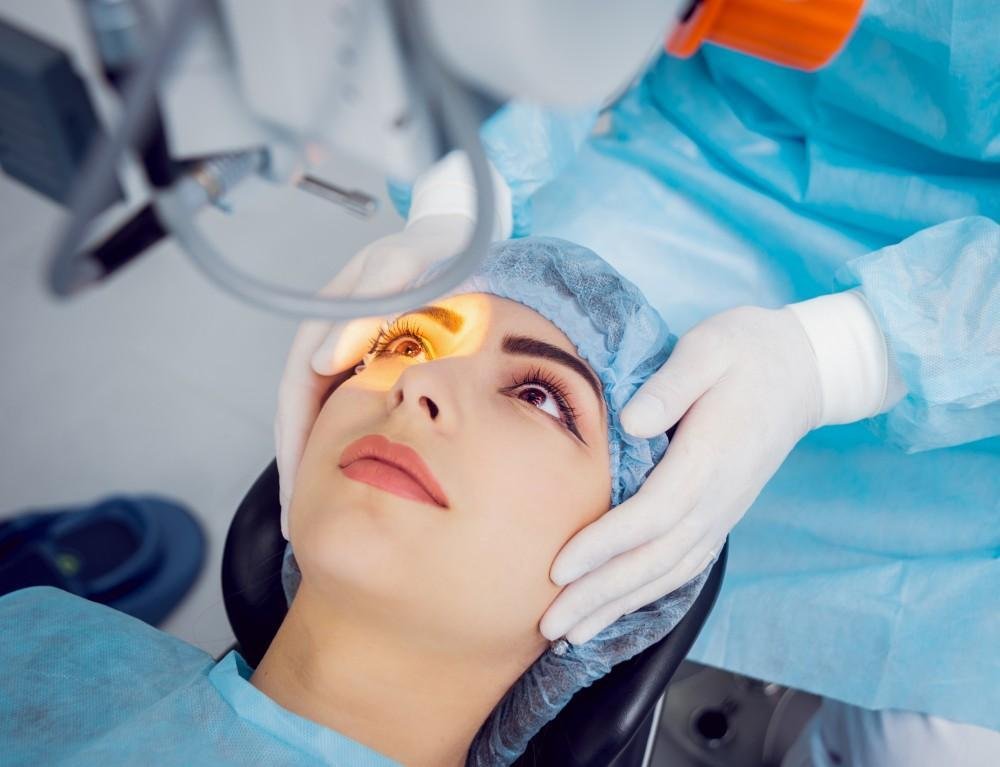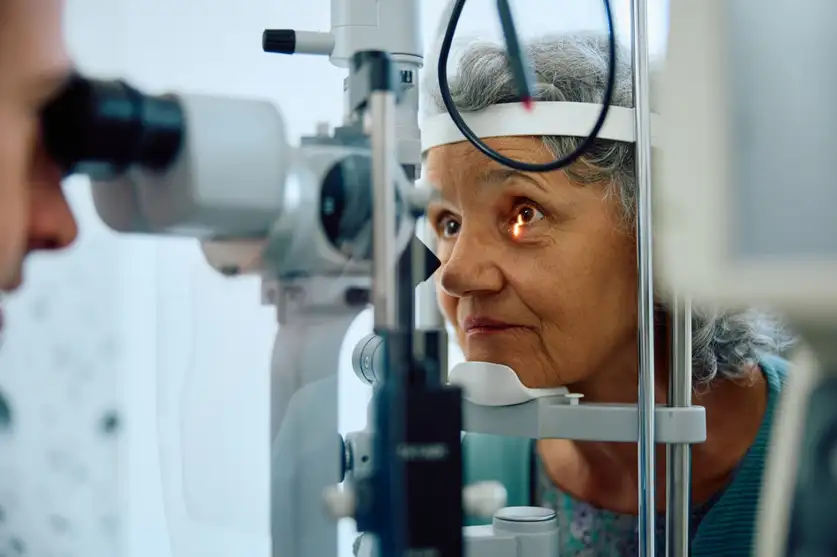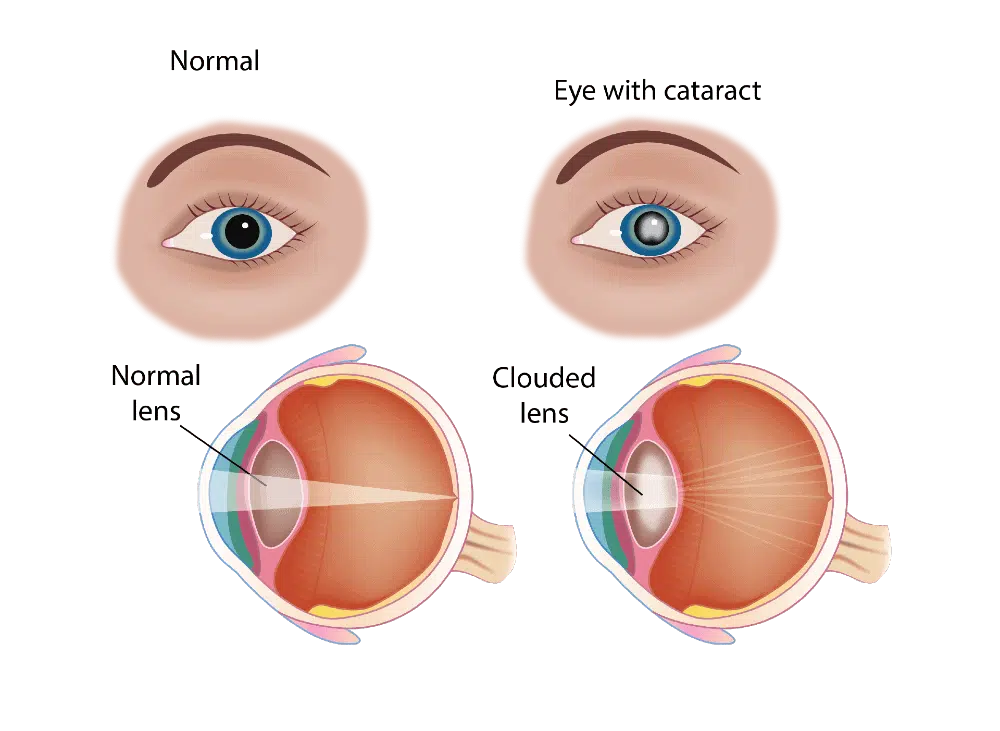Cataract Surgery – Restore Your Clear Vision with Total Surgicare
A cataract is a common eye condition that causes clouding of the natural lens, leading to blurry vision and difficulty in daily activities. If left untreated, it can significantly impact your quality of life. At Total Surgicare, we offer advanced, painless, and quick cataract surgery using the latest laser and phacoemulsification techniques. Our expert surgeons ensure safe and effective treatment with fast recovery and improved vision.
Book Appointments With Our Expert Doctors Near You

No-Cost EMI

Support in Insurance Claim

USFDA-Approved Procedure

1-day Hospitalization

Get consultation for 50+ diseases across India

Extensive medical assistance throughout your treatment

In-person and online consultation with experienced doctors
Cataract Surgery – Restore Your Clear Vision with Total Surgicare
A cataract is a common eye condition that causes clouding of the natural lens, leading to blurry vision and difficulty in daily activities. If left untreated, it can significantly impact your quality of life. At Total Surgicare, we offer advanced, painless, and quick cataract surgery using the latest laser and phacoemulsification techniques. Our expert surgeons ensure safe and effective treatment with fast recovery and improved vision.
- Procedure Type
Surgical
- Common/ Other Name of surgery
Phacoemulsification
- Procedure Duration
20-30 minutes
- Anesthesia
Topical

No-Cost EMI

Support in Insurance Claim

Advanced Treatments

1-day Hospitalization

What are cataracts?
Cataracts are cloudy areas that form on the lens of your eye. Your lens is a clear, flexible structure made mostly of proteins (crystallins). As you get older, the proteins in your lens break down, forming cloudy patches that affect your vision.
You may feel as if you’re looking at the world through a dirty window. Over time, your vision gets worse. You may have a hard time carrying out routine tasks.
Healthcare providers consider cataracts an inevitable part of aging, and age-related cataracts are the most common form of the condition.
But you don’t have to live with fading vision. Ophthalmologists can do surgery to remove the cataracts and restore your vision.

Types of Cataracts
While this article focuses on age-related cataracts, other types include:
- Pediatric Cataracts – These affect babies and children, either present at birth (congenital) or developing later in life. They are often hereditary but can also result from eye injuries or other conditions. If left untreated, they may cause vision issues like amblyopia (lazy eye). Early diagnosis and treatment are crucial for normal visual development.
- Traumatic Cataracts – These develop due to an eye injury, which may also damage surrounding eye structures. Depending on the severity, surgery may be required to restore vision. Recovery and treatment can be more complex than other types due to the potential for additional eye damage.
- Secondary Cataracts – Also known as posterior capsular opacification, these occur when cloudy patches form on the lens capsule after cataract surgery. Though they can blur vision, they are easily treatable with a quick, painless laser procedure called YAG laser capsulotomy.



Symptoms and Causes
What are the symptoms of cataracts?
Cataract symptoms include:
- Vision that’s cloudy, blurry, foggy or filmy.
- Changes in the way you see color (colors may look faded or not as vivid).
- Sensitivity to bright sunlight, headlights or lamps.
- Glare, including halos or streaks that form around lights.
- Difficulty seeing at night.
- Changes in your vision prescription, including near-sightedness that gets worse.
- Needing a brighter light to read.
- Double vision.
Are cataracts painful?
Cataracts don’t usually hurt. But they can cause discomfort by making your eyes more sensitive to light.
Causes of Cataracts
- Aging (Senile Cataracts) – The most common cause, due to protein breakdown in the lens over time.
- Genetics – A family history of cataracts increases the risk.
- Diabetes – High blood sugar can lead to early cataract formation.
- Trauma – Injury to the eye can cause a cataract to develop rapidly.
- UV Radiation – Prolonged exposure to sunlight without protection can accelerate cataract formation.
- Smoking & Alcohol – Increases oxidative stress, leading to lens damage.
- Medications (Steroids, etc.) – Long-term use of corticosteroids can cause cataracts.
- Eye Diseases (Uveitis, Glaucoma, etc.) – Inflammation or other conditions can lead to secondary cataracts.

Types of Cataract Lenses & Their Costs in India
| Lens Type | Cost (₹ per eye) | Features | Pros | Cons |
|---|---|---|---|---|
| Monofocal Lenses | ₹5,000 – ₹25,000 | Clear vision at one fixed distance | Affordable | May require glasses for some tasks |
| Multifocal Lenses | ₹35,000 – ₹80,000 | Sharp vision at multiple distances | Reduces glasses dependency | May cause glare or halos at night |
| Toric Lenses | ₹30,000 – ₹60,000 | Corrects astigmatism | Provides sharper vision for corneal irregularities | Costlier than monofocal lenses |
| Extended Depth of Focus (EDOF) Lenses | ₹50,000 – ₹1,00,000 | Continuous range of vision (intermediate & far) | Fewer visual disturbances | May not provide perfect near vision |
| Accommodative Lenses | ₹40,000 – ₹90,000 | Mimics natural eye focusing | Reduces need for glasses | Near vision may not be very fine |
Is cataract surgery safe?
Cataract surgery is one of the safest and most commonly performed surgeries in the U.S. Most people have no serious complications. But it’s important to be aware of all possible risks, including retinal detachment and infection.
Certain eye diseases or underlying medical conditions can raise your risk of complications. So, you should talk to your provider about your individual level of risk prior to your surgery. Also, ask how they can treat any potential problems that may occur.
Recovery from cataract surgery
You may have mild pain and discomfort after your surgery. Your provider can give you a pain reliever to use for the first day or two.
Full recovery takes four to eight weeks. But you should notice improvements in your vision much sooner. Your provider will tell you when it’s safe to return to your usual activities.
01.
Advanced Cataract Surgery
At Total Surgicare, we use advanced surgical techniques to safely and effectively remove cataracts, restoring clear vision with minimal discomfort and downtime.
02.
Expert Ophthalmologists
At Total Surgicare, our highly skilled cataract surgeons have over 10 years of experience and extensive expertise in performing safe and effective cataract surgery. Each patient receives a personalized treatment plan for optimal vision restoration.
03.
No Visible Scarring
Cataract surgery is a minimally invasive procedure with a quick recovery time. It leaves no visible scarring and significantly improves vision, making it a safe and effective treatment option.
04.
Minimal Risk of Recurrence
Our doctors ensure that the entire cloudy lens is removed during cataract surgery, significantly reducing the risk of recurrence and restoring clear vision effectively.

